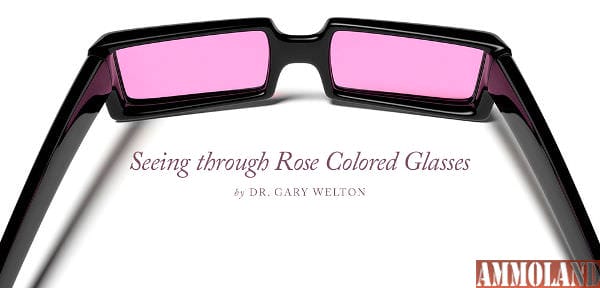Seeing Through Rose Colored Glasses
by Dr. Gary Welton


Grove City, PA -(Ammoland.com)- Mary Poppins was “practically perfect in every way,” except that Mary Poppins isn’t real.
I fall very short of “practically perfect” in any way, every single day. I do things I regret; even more I fail to do things I should. Beyond these sins of omission and commission, however, even when I do the right things, I often do them for the wrong reasons.
Hester wore a scarlet “A” on her chest. I wear almost the entire alphabet. Perhaps my “A” is for arrogance; my “G” is for greed; and my “J” is for jealousy. My “S” is in the largest font of all and represents selfishness. I’m just getting started, but that’s enough self-disclosure for now.
These habitual sins of mine are often private; they occur within my mind. Yet they are not victimless sins, as they impact the way I behave toward those around me, when I communicate messages of personal prejudice rather than messages of love. I have much higher expectations for myself, yet I deal with many of the same struggles and sins that I faced 30 and 40 years ago. I am a vile sinner in desperate need of God’s continuing work in my heart and life.
Some people see the “H” that I wear and accuse me of hypocrisy. Whenever I convey the attitude that I think I am “holier than thou,” then I deserve that “H.” I know better, on most days, because I am painfully aware of my inner sins; I am aware that many times when I do the right thing, I do it for the wrong reasons. Instead of seeking to love and to serve, I seek recognition, honor, praise, and self-glory. My obedient behavior is often selfishly evil to the core. My “S” is in the largest font available.
I don’t wear an L, G, B, or T. Those are not my particular struggles. They may be yours, and I am glad to have open and honest discussions with you about the struggles and issues you face, whether they be similar to or different from mine. Although our struggles might look unique, in fact we share our human inability to please a holy God.
The glory of the Christian faith, however, is that when God looks at me, he cannot see my scarlet letters, because he is looking at me through rose colored glasses, tinged with the precious blood of Jesus Christ. He doesn’t wear glasses because his eyes are faulty, but he chooses to view me and my self-righteousness (which is nothing but filthy rags) through the redemptive power of Christ. Because of the rose colored glasses, the reality of my scarlet letters is whitewashed, and the only thing that shows through the lens is the cross.
On bad days I forget my scarlet letters and overlook the cross. On those days I am properly labeled as a hypocrite. On most days, however, I am painfully aware of my human condition. My weaknesses force me to be dependent on Christ’s work on my behalf.
Wikipedia defines the use of “rose colored glasses” as “Optimism, the tendency to see things in an unrealistic positive light.” When God views me through the righteousness of Christ, he is using “an unrealistic positive light,” in that my struggles continue for a lifetime, if only to remind me of my utter dependence on him.
A short column cannot present this topic with the necessary nuances. I point the serious reader to Barbara Duguid’s 2013 award-winning book,Extravagant Grace: God’s Glory Displayed in Our Weakness, in which she is able to discuss the larger context and to balance the competing arguments. I am confident that her book will be as encouraging to you as it has been to me.
The struggles that you face are likely different from mine, but we share our human condition and our need for the righteousness of Christ. I am deeply grateful that God sees me through rose colored glasses.

About the Author:
Dr. Gary L. Welton is assistant dean for institutional assessment, professor of psychology at Grove City College, and a contributor to The Center for Vision & Values. He is a recipient of a major research grant from the Templeton Foundation to investigate positive youth development.
